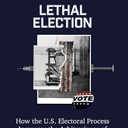
The Kansas Supreme Court has upheld the state’s death penalty against two death-row prisoners’ challenges that capital punishment violates the “inalienable” right to life enshrined in the Kansas state constitution.
In separate decisions rendered in the cases of brothers Reginald and Jonathan Carr on January 21, 2022, the court held that the right to life guaranteed in Section 1 of the Kansas Constitution’s Bill of Rights “is not absolute or nonforfeitable” and is forfeited “once a defendant has been convicted of capital murder beyond reasonable doubt.” The court found that numerous constitutional violations had occurred in the brothers’ joint trial in 2002 but affirmed their convictions and death sentences nonetheless, ruling that each of the violations constituted “harmless error” and cumulatively did not affect “the jury’s ultimate conclusion regarding the weight of the aggravating and mitigating circumstances, i.e., the death sentence verdict.”
The court had previously overturned the Carrs’ death sentences on two separate grounds in 2014. First, the court ruled that their joint sentencing trial before a single jury violated the Eighth Amendment because each brother presented mitigating evidence to spare his life that exposed the jury to prejudicial facts about the other brother that they were not permitted to consider in deciding the other brother’s sentence. In addition, the court ruled, the trial judge had unconstitutionally failed to instruct the jury that, unlike other facts in the case, the brothers were not required to prove beyond a reasonable doubt the mitigating factors they presented to the jury.
In January 2016, the U.S. Supreme Court reversed those rulings and returned the cases to the Kansas high court to resolve the other penalty-phase issues the Carrs had raised in their original appeals. The brothers can seek review of the state court’s ruling by the U.S. Supreme Court and then have the right to pursue state post-conviction and federal habeas corpus appeals. That part of the appeals process typically takes a decade or more to complete.
The Right to Life Under the Kansas Constitution
The Carr brothers both challenged the constitutionality of Kansas’ death-penalty statute, arguing that it violated the guarantees of “life, liberty, and the pursuit of happiness” contained in Section 1 of the Kansas Bill of Rights. They argued that Section 1 created an “inalienable” right to life that would be unconstitutionally extinguished by execution, seeking to apply the reasoning of a prior ruling by the court that recognized a state constitutional right to abortion under Section 1.
The court unanimously disagreed, holding that the framers of the state constitution “did not intend the term ‘inalienable’ in section 1 … to be construed as ‘absolute’ and ‘nonforfeitable.’” “Inalienable,” the court wrote, “refers only to one’s ability to transfer his or her right or interest to another person.” The justices concluded, “the natural right to life is forfeitable, and the state’s imposition of the death penalty under Kansas’ capital sentencing scheme does not infringe upon the ‘inalienable’ right to life protected under section 1.”
A Trial Riddled with ‘Harmless Error’
The court found that there were multiple constitutional and legal violations in the Carrs’ penalty hearing but nevertheless upheld their death sentences on the grounds that the errors had no impact on the jury’s sentencing verdict.
“We are convinced there is no reasonable possibility the identified errors, deemed harmless in isolation, cumulatively affected the jury’s ultimate conclusion regarding the weight of the aggravating and mitigating circumstances, i.e., the death sentence verdict,” the court wrote. “To borrow … from the United States Supreme Court, given the State’s evidence ‘[n]one of that mattered. We are satisfied the jury correctly understood its charge and was not swayed by the aggregate impact of these identified (trial) defects.’”
Among the errors, the court found that:
- The trial court’s failure to provide separate penalty phase trials of the brothers violated Kansas law.
- The trial court allowed prosecutors to reference hearsay statements recorded in police reports while cross-examining several of Reginald Carr’s penalty-phase mitigation witnesses.
- The trial judge improperly denied a continuance that would have allowed a defense mental health expert to be present during the prosecution expert’s testimony and to provide testimony rebutting the state’s expert.
- The trial court violated state law by failing to inform the jury how long the Carrs would would be required to serve in prison on the non-capital, as well capital charges, if the jury returned a life sentence on the capital charges
- The trial court’s oral instructions misinformed the jury that it could impose a death sentence even if aggravating circumstances did not outweigh mitigating circumstances.
- The Carrs’ prosecutor impermissibly expressed personal opinions “intended to bolster the credibility of the State’s expert witness.”
- The prosecutor misstated how the jury was to weigh aggravating and mitigating circumstances.
Chief Justice Marla Luckert dissented in both cases. “In this appeal, we review a trial riddled by error,” she wrote. “The ultimate question before us is whether there is a reasonable possibility the cumulative effect of all errors might have affected even one juror’s decision to impose the death penalty. Given the nature and volume of errors, I cannot eliminate the possibility that at least one juror would have decided mitigating factors or mercy outweighed the aggravating factors put forward as reasons to sentence [the Carr brothers] to death.”
Kansas’ last execution was in 1965, when co-defendants George York and James Latham were executed for a murder they committed while they were teenagers. Kansas juries have imposed only two death sentences in the past decade and none since 2016.
Dion Lefleur, Kansas Supreme Court upholds death penalty for Carr brothers in spree that killed five, Wichita Eagle, January 21, 2022; Dion Lefleur, Carr brothers can still appeal death penalty after Supreme Court ruling, DA and AG say, Wichita Eagle, January 21, 2022; Heather Hollingsworth, Death sentences upheld in case dubbed ‘the Wichita massacre’, Associated Press, January 21, 2022.
Read the Kansas Supreme Court’s January 21, 2022 decisions in State v. Reginald Carr and State v. Jonathan Carr.



